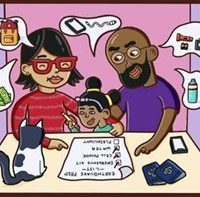Communication Strategies: Hurricane Preparedness

By: Celeste Mazloum
Hurricane season officially ends in Florida on November 30th, until then there are a few things to do in order to be prepared. It is important to plan ahead for yourself and your loved ones. You can do this by staying informed during hurricane season. Three strategies we recommend are using weather updates, social media, and having a communication plan with family or loved ones.
In this article, you will learn key communication strategies and essential preparation information!
First, it is important to regularly check weather updates from trusted sources like the National Hurricane Center (NHC) and local news outlets. There you will learn about official watches, warnings, and forecasts.
Accommodations Include:
Visual
- The NHC’s website has accessible features like descriptions of pictures, programs that read the website information aloud, and simple language to convey information.
- The National Oceanic and Atmospheric Administration (NOAA) is another resource that has a weather radio which provides weather and emergency information 24/7. This information can be shared through alerts which inform visually impaired individuals, at night or even during power outages.
Deaf and/or Hard-of-Hearing
- To make sure important information is accessible to Deaf and hard-of-hearing individuals, the NHC and NOAA provide sign language interpreters during briefings and meetings.
Second, social media can be a great way to stay informed, communicate with others, and get updates. However, it is important that you make sure to follow official accounts like emergency management agencies and news outlets.
General Accommodations Include:
- Information in simplified language and post visual aids like infographics.
- Some reliable Instagram accounts include:
- @nwsnhc_hurricanes
- @noaa
- @hurricaneready
- @mpdpolice (or your local police department)
- @miamidadecounty (or your local governmental office)
Third, create a communication plan with your family. An efficient way to do so is to create a group chat, making sure every family member can access and understand key information. In the chat, you could discuss an emergency plan, including emergency meeting locations and contact information to keep with you. You could share pictures and videos of your emergency kit to remind and encourage family members to prepare themselves.
Accommodations Include:
Visual
- Individuals with visual impairments or reading difficulties could use the Text-To-Speech on their phone which says written text aloud.
Deaf and/or Hard-of-Hearing
- Speech-To-Text could also be used on phones which turns spoken words into text, allowing for hands free writing!
Using accessible features allows everyone to stay informed in the family!
It is also important to determine whether you are in an evacuation zone. An evacuation zone is an area during a hurricane that officials may order people to leave because they may be affected. Evacuation zones are labeled from A through K. With zone A being the parts of Florida that are most likely to be evacuated first and ranging to the most likely to be evacuated last. To see where your house falls, you can click here:
From there, you should identify shelters near you that provide disability accommodations and how to prepare in case you need to go to one.
There are Special Needs Shelters (SNS) that provide extensive care for individuals who need more support than typical shelters can provide. Learn more about SNS here. It is important to sign up in advance for shelters to be prepared. Click here to learn more about the importance of registering in advance. If you have more questions or want to register, click here for the Florida Special Needs Registration.













